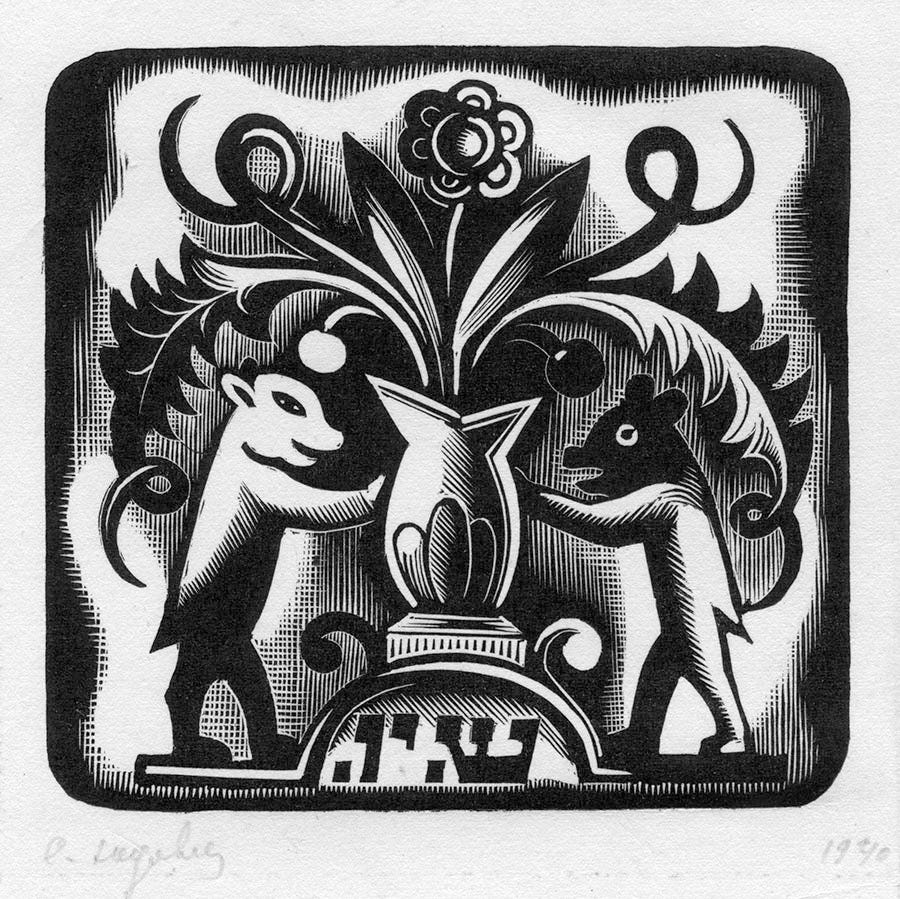💡 Think:
There’s a puzzling account in this week’s Torah portion, Isaac, fearing he’s at the twilight of his life, wishes to bless his children. He chooses, however, not to bless Jacob, the progenitor of the Jewish people and righteous child, but rather his son Esau, the uncouth and violent son, who scorned his birthright and traded it for a bowl of lentils.
”Behold now,” Isaac says to Esau. “I have grown old; I do not know the day of my death… go forth to the field, and hunt game for me. And make for me tasty foods as I like, and bring them to me, and I will eat, in order that my soul will bless you before I die."
Rebecca, his wife, tells Jacob that he should bring the game to her, so that she prepare the food to Isaac’s taste, and thus the blessing should be bestowed upon Jacob.
Jacob does as his mother request. In order to not rouse Isaac’s suspicion, Jacob dresses in the costly garments of his brother. His smooth hands and smooth neck are covered with the hides of the goats he slaughtered.
There are two questions that arise from this story.
Why is it that Isaac preferred to bless Esau —the wicked child— over Jacob, the righteous one?
And if Jacob was indeed meant to receive his father’s blessings, as indeed the Torah makes clear, why did he need to do it through trickery and deceit?
In his magnum opus, the Tanya, Rabbi Shneur Zalman of Liadi, the founder of the Chabad Movement, explains the two types of spiritual journeys we embark on, which in turn require two different modalities of divine service.
Most of us face the seemingly intractable struggle against the evil inclination - the cynical voice that tries to drag us down and distract us from our goal. This person, the beinoni, the everyman, must engage in constant spiritual struggle to refine himself.
Then, a select few, the tzadik, is someone that has a more serene, elevated experience. Where the beinoni toils, the tzadik elevates.
As challenging this may seem, the beinoni’s constant struggle to serve G-d is itself a a service of G-d. In Rabbi Shneur Zalman’s words1, “For perhaps this is what he was created for, and this is the service demanded of him—to subdue the sitra achara [lit. the other side, the force of negativity] constantly.”
“For perhaps this is what he was created for”
Why would the Creator want someone to live a life of battle? For this, the Tanya quotes our Torah portion:
”This [struggle] is alluded to in the verse, “And make me delicacies, such as I love,” where the word matamim (“delicacies”) is written in the plural, indicating two kinds of pleasure.”
These words are the charge of G-d to the Jewish people.
”Just as with material food, there are two kinds of delicacies —one of sweet and luscious foods and the other of sharp or sour articles which are unpleasant to eat in their natural state, but have been well spiced and prepared so that they become delicacies which revive the soul— so, too, are there two kinds of spiritual delicacies.”
The struggle is the end, because the person who struggles connects to G-d in a way that is deep and profoundly abiding.
This week, the world was rocked by abduction and murder of a Chabad rabbi in UAE, Rabbi Zvi Kogan. For a Jew, who devoted his life to caring for others, for insuring that even visitors to Dubai could enjoy a kosher meal, to be so heinously snatched away from us… feels perverse and unfathomable.
Indeed, such tragedies are unfathomable —they arise from a place in the Creator that the mind, with all its human frailties and limitations— can not possible comprehend.
And yet, within that difficulty, within that pain, there is the profound beauty of sacrifice2. This isn’t the normative service of the Creator. That service is sweet. This is spicy, bitter, sharp and hard to swallow… but in it, there is also a level of commitment to the Divine that no other form of service can approach.
The rabbis in the Midrash3 note the profound effect of self-sacrifice from a generation that faces persecution… Sacrifice of this nature is so profound, that it alone bring about order and form to physical world.
When we perform Torah and Mitzvot, we connect to G-d on the normative, rational plain. When, during the darkest times, when G-d is hidden and concealed and yet still, Jews face the ultimate test… that exposes a transcendent connection the Creator.
For at this moment, a contradiction is experienced. The darkest of moments, the snuffing of a life committed to goodness and kindness, during a year of unspeakable trials - is the greatest expression of concealment, a complete and total void free from our normative modality of Jewish expression. Yet, when from that very darkest point, we collectively respond with light, with joy not of levity but determination and purpose, we expose the Divine in the highest order. In the mystery of that contradiction is synthesis of our purpose.
This explains what Isaac saw in Esau. In his wayward son, he saw the profound potential for divine service4. Not in the tzadik, in the sweet-service of Jacob the yeshivah student, but in the bitter-spicy zest of Esau, who struggled — and at his perhaps unrealized core— could connect to the divine in a transcendent level.
And this is why Jacob needed to disguise himself in order to receive the blessings. Even Jacob must ultimately engage with the world, invest himself —albeit temporarily- in the clothes of the one he must elevate.
May we only experience the true sweetness going forward.
🏃 DO:
♟️ Join us Friday, December 6th for our First Friday: Board Game Shabbat! Take part in a delicious Shabbat meal followed by some amazing games.
🕯️ Chanukah is coming… Keep your eyes on this space for details.
📚 The weekly Tech Tribe Parshah on Tap. Join each week for a look at the Torah portion, share your thoughts and join countless other Jews around the world. Drinks, fun and Torah with your Tech Tribe fam!
🕎 Join Tech Tribe and Jewglers for a curated conversation.
FLAMES OF DEBATE: ELECTRICITY, TRADITION & THE MENORAH on December 18.
🍷 Join us for our next Third Thursday Tech Schmooze, on December 19th.
💬 Chana’s Version:
Parshas Toldos tells the story of Yitzchak and Rivka’s twin sons, Yaakov and Esav, who represent two very different approaches to life. Yaakov is described as a "wholesome man, dwelling in tents," while Esav is a man of the field, driven by his impulses and external pursuits. Their contrasting paths highlight the tension between inner purpose and outward distractions—a dynamic that resonates deeply in our modern, online world.
Today, we live much of our lives in virtual spaces, where it’s easy to get caught up in the “fields” of endless scrolling and instant gratification. But Parshas Toldos challenges us to cultivate the qualities of Yaakov by creating meaningful, intentional spaces online. Sharing a message of kindness, engaging in thoughtful conversations, or even pausing to connect with someone authentically in a world of constant noise can be a modern-day way of “dwelling in tents.”
The Torah also tells us that Yitzchak re-dug the wells his father Avraham had dug, wells that had been sealed up. This act of uncovering teaches us the importance of reclaiming sources of meaning and inspiration that might feel buried under the distractions of everyday life. In a digital context, it’s a reminder to use the internet not just as a tool for entertainment, but as a space to draw out deeper waters—to inspire, connect, and share goodness with others.
Wishing you a Good Shabbos.
🌱 #ChaiSociety
Special thanks to the #ChaiSociety members who donate monthly to support our community!
Adam Kotok, Avrohom Margolis, Bill Dilworth, David Lobron, Cal Nathan, Chanoch Rosenberg, Fitz Tepper, Hershey Gutnik, Jacob Ner-David, Lev Podelko, Levi Plotkin, Liel Leibovitz, M. Kahn, Manilan Houle, Mattanya Ginsburg, Melissa Davis, Mendel Konikov, Michael Morgenstern, Nikita Sokolsky, Scott Shapiro, Sholom Laine, Tzali Reicher
Tech Tribe is entirely community-funded - Invest in Tech Tribe (starting at $36 a month), and join the monthly #ChaiSociety!

📚 Read:
📖 DEEP READING: How a genAI application to boost the study of Jewish texts can have far greater lessons.
🏙️ How New York transformed from tech backwater into global venture capital
🤝🏻 When the Chabad Shaliach Met Esau. Words from the inimitable Dr. Mijal Bitton in her new substack Committed.
🫂 6,500 Rabbis and Guests Gather in New York in Aftermath of UAE Terror Attack
💰 Yaakov and Esav, and the Paradox of Money and Wealth
🔠 Yiddish Is a Supposedly Dying Language That’s Thrillingly Alive
🔥 Lit:
This week, light Shabbat candles in NYC at 4:12 PM
For Shabbat candle-lighting time in your area click here.
🙏 Pray:
Please share good vibes, prayers and tehilim for Glikah Leeba bas Esther Shayndel for a complete recovery
Like what you saw? Want more? Please feel free to forward this email far and wide!
Support Tech Tribe’s mission to build community and curate epic experiences for young Jews in tech and digital media!
Follow us on Social: Twitter | Facebook| Instagram
Find out if your company does employee matching! We’re now listed on Benevity YourCause and Bright Funds!
Tech Tribe is an affiliate of Chabad Young Professionals Tax ID 82-2619676
Tanya, Likkutei Amarim ch. 27
See: וירח הוי׳ את ריח הניחוח – מוצאי ש״פ נח, אור לז׳ מרחשון ה׳תש״מ
See Likkutei Sichos vol 20, Toldos 2








